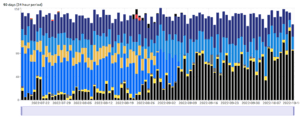Switzerland-based Bitcoin Association, the global industry organization pushing for the development and adoption of the BSV Blockchain, revealed that an empty block miner has been detected on the BSV network.
“There currently exists a majority miner on the Bitcoin SV network producing empty blocks. This miner intentionally obfuscates their coinbase string with a constantly changing string, but is commonly identifiable by the address 1KPSTuJMCMRXrTWHfCwpiRZg1ALbJzh844 where the coinbase rewards are being sent,” a statement from Bitcoin Association read.
“Alongside trying to be anonymous while mining a global public ledger, we have observed a pattern of malicious activity from this miner that has increased week after week… They have steadily been increasing their hashrate on the chain for months.”
According to the statement released on October 16, the empty block miner used to be an honest node mining block filled with transactions, and they have been operating on the BSV network since 2020. However, in June 2022, Bitcoin Association caught them mining empty blocks and engaging in suspicious activities, and they continue to do so at an increasing rate.
“Alongside this disruptive behavior, there are continuous coordinated DDoS attacks on key network infrastructure and services. There have also been numerous incidents of transactions not being treated normally as well as targeted attempts to disrupt network pillars with abnormal and suspicious behavior,” the Association stated.
In black is the hash rate of the empty block miner.
An empty block miner is just like any other node on the network. They essentially follow the proof-of-work mechanism, and they compete with other nodes to win the right to add a block to the blockchain. The main difference is that they do not process transactions and put as many as they can into a block, effectively adding an empty block onto the blockchain.
A miner earns through block rewards, which include transaction fees and newly minted Bitcoin. Unlike fiat currency, Bitcoin does not have an unlimited number of coins that can be minted whenever they are needed. There are only 21 million coins, and this will be completely depleted by the year 2140.
Every four years, Bitcoin halves the coins minted and awarded for each block added onto the blockchain. Today, only 6.25 coins are given as block subsidies. The next halving will be in 2024. And the continuously decreasing number of coins given as block rewards is one of the main reasons why scaling is being done by the BSV Blockchain.
Scaling increases block sizes and throughput. Bigger blocks can contain more transactions, and high throughput means increasing the rate of the transactions processed per second. At present, BSV is already completing 4GB blocks at 50,000 to 100,000 transactions per second—rivaling that of the VISA network. In fact, just last April, a single block on the BSV Blockchain contained a record-breaking 2.5 million transactions.
As the network scales, terabyte-sized blocks and millions of transactions per second are possible in the future. This leads to miners earning more from transaction fees than block subsidies, which means that Bitcoin mining can remain a lucrative business even with continuous halvings.
https://youtube.com/watch?v=EdhD4sRrHPs
Empty block miners harm the network as adding other completed blocks full of valid transactions on the blockchain is delayed. Furthermore, scaling can only be successfully done when all the nodes on the network compete with each other to process a perpetually growing number of transactions in a single block. Empty block miners defeat this purpose and serve to weaken the network.
The empty block miner is considered a dishonest node as Bitcoin Association found that they failed to fulfill four of the six steps in running a node as stated in the Bitcoin whitepaper, which is as follows:
- New transactions are broadcast to all nodes.
- Each node collects new transactions into a block.
- When a node finds proof of work, it broadcasts the block to all nodes.
- Nodes accept the block only if all transactions in it are valid and not already spent.
“As has been observed in the past week, this miner is ignoring the tens of millions of broadcasted fee-paying transactions from users and other nodes in the network in favor of producing empty blocks. Bitcoin Association has independently validated that this miner is not providing a consistent nor transparent policy,” Bitcoin Association wrote.
“This miner is actively attacking the network in an attempt to reap block rewards while disrupting the economic activity of innocent users, businesses, and honest miners… Honest miners have been demonstrating that Bitcoin can scale to serve billions of users when miners take their role seriously as professional commercial entities.”
After months of observing and gathering data, Bitcoin Association is taking action by informing all connected exchanges and nodes and requesting for them to freeze the block rewards earned by this empty block miner. The Association is also investigating the identity of this malicious miner, and once their identity is verified, they will be facing criminal charges for the harm that they did to the BSV network and its honest nodes.
It must be remembered that, although the digital currency space is known for being a haven for illegal activities, the industry is still teeming with honest businesses that make the market thrive. It was never the goal of Bitcoin to become used for crime, and malicious actors should be caught and penalized in order for the industry to flourish in the future.




































